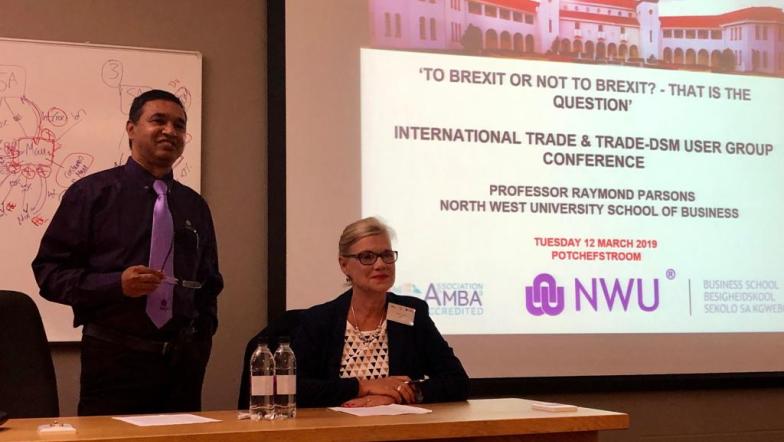South Africa Chair organizes trade conference at North-West University in Potchefstroom

The likely impact of the United Kingdom’s departure from the European Union and the recently launched African Continental Free Trade Area were among the issues debated at an international trade conference held at the North-West University (NWU) campus in Potchefstroom on 12 March 2019. The conference was organised by the NWU’s WTO Chairs Programme in collaboration with Trade Advisory, drawing delegates from South Africa’s national and provincial governments, other member countries of the Southern African Customs Union, academic institutions, development organisations and the private sector.
In the opening session, Prof Raymond Parsons from the NWU Business School outlined the two-year history of the Brexit negotiations, highlighting what the likely impact is for South Africa’s continued trade dealings with the United Kingdom.
South Africa and the United Kingdom have longstanding trade and investment ties and enjoy a fairly high level of regulatory consistency. Prof Parsons said that although the Brexit deliberations and eventual outcome are largely beyond South Africa’s control, South African businesses should engage with their local industry chambers and associations to keep pace with developments so that they can determine the best way forward for their trade and investment dealings with British companies.
Ms Claudia Furriel from the International Trade and Economic Development Division of the Department of Trade and Industry provided an account of the newly launched African Continental Free Trade Area (AfCFTA) ‒ including its rationale and objectives, the current trajectory of the negotiations, and how it could become a game changer in intra-Africa trade relations, particularly among non-traditional trading partners/regions.
Although the African market is vast and growing rapidly, it is not well integrated and therefore intra-regional trade is limited. According to the WTO (2015), intra-African trade stands at 18%. In contrast, intra-EU trade stands at 70%, intra-North American trade at 50% and intra-Asian trade at 52%. The rationale for the launch of the AfCFTA is to stimulate much more intensive trading activity on the continent by making it more attractive and easier to trade with regional trading partners. The AfCFTA essentially creates a single market for African goods and services, providing for the progressive liberalisation of tariffs and the removal of non-tariff barriers (including non-harmonised regulatory regimes and customs procedures, and infrastructural bottlenecks). It is also seen as a springboard to new forms of investment, which are needed to stimulate industrial development on the continent.
The business case for opening up the African market, explained Ms Claudia Furriel, is compelling, with the AfCFTA poised to become the largest free trade area in the world. A bigger market offers economies of scale, as-yet-untapped export opportunities in new regions, a more rules-based trading landscape and greater prospects of attracting investment.
South Africa has long championed broader integration in Africa, stressing that the process should be developmental in nature with market integration, infrastructural development and industrialisation as key goals. A centrepiece of South Africa’s approach to trade negotiations, which is informed by the country’s National Development Plan (NDP), NGP (National Growth Path) and IPAP (Industrial Policy Action Plan), is that policy space should not be limited. South Africa accounts for nearly 25% of intra-African trade, with its main exports to Africa comprising minerals, machinery, chemicals, and iron and steel in 2017. South Africa’s main export markets are Southern and East Africa, and so the AfCFTA could be a source of new market opportunities for its value-added goods.
Prof Ludo Cuyvers from the Centre for ASEAN studies at the University of Antwerp pointed out that if a country or region aspires to greater economic integration, it needs mechanisms in place to drive economic conversion. In South-East Asia, he remarked, there is a big development gap between developing and more advanced economies, with a proliferation of non-tariff barriers often being a stumbling block to successful integration. This is likely to be Africa’s experience as well as it works towards adopting the single market concept. Taking active steps to bridge the divide and afford more countries the opportunity of becoming significant exporters will be a key factor in the AfCFTA’s success. Effective export promotion is central to this process.
"It is all too easy for a country’s export promotion efforts to lack direction or depth," said Prof Cuyvers. "This is why the NWU’s TRADE-DSM®, a market selection tool that pinpoints export opportunities using a systematic data filtering process, is such an important innovation."




